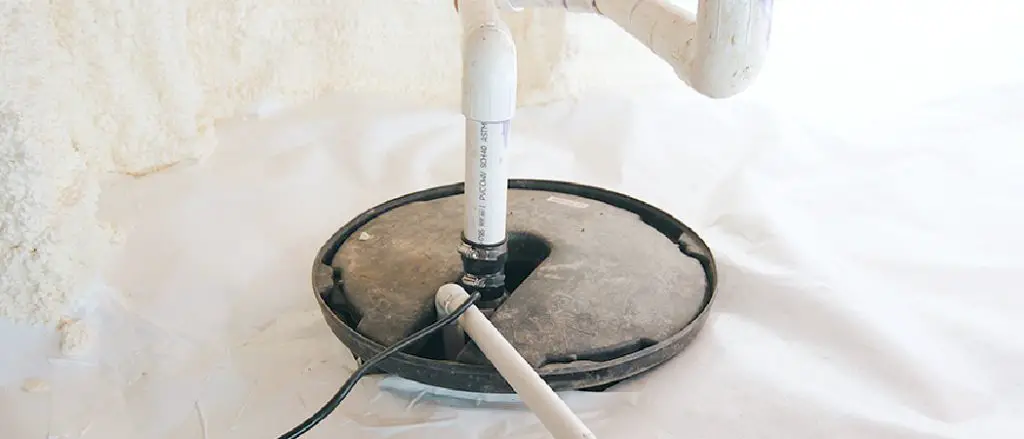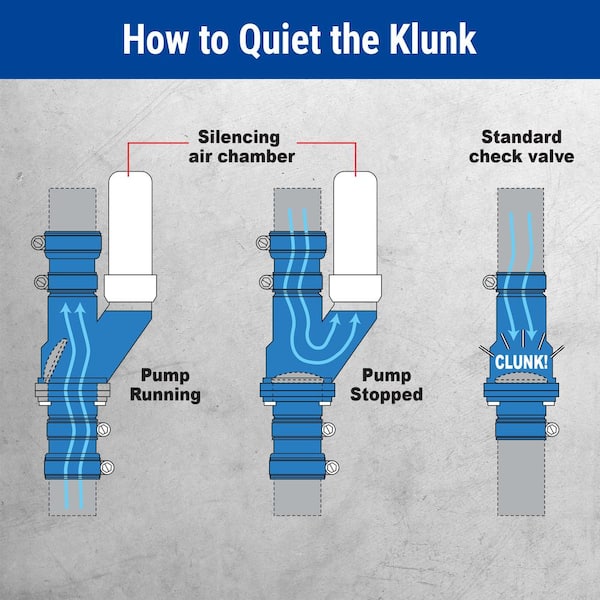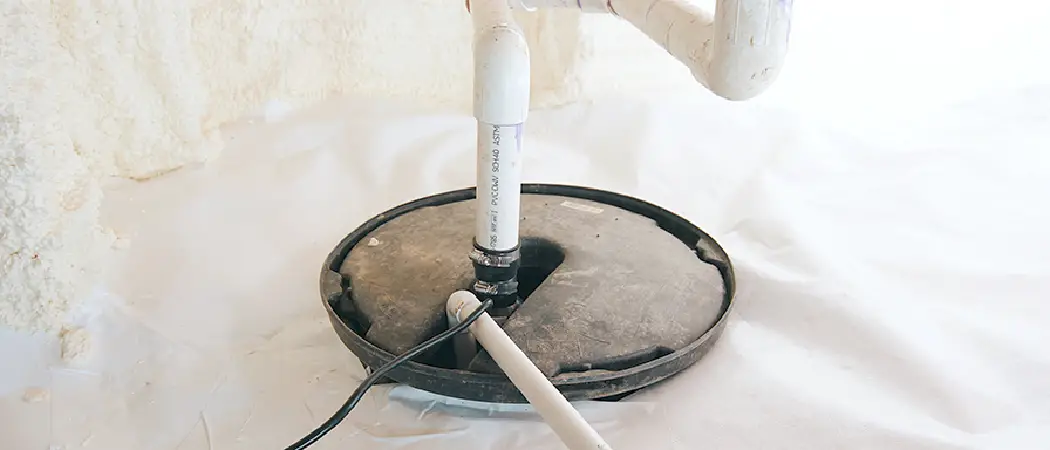To quiet a sump pump, consider adding insulation or damping pads under the unit and the discharge pipe to reduce noise. Additionally, installing a check valve can help to minimize vibrations and noise from the water flow.

Choosing The Right Location
It is crucial to select an appropriate spot for your sump pump to minimize noise.
Ensuring Proper Installation
Installing the sump pump correctly is essential for noise reduction.
- Place the pump on a stable surface to prevent vibrations.
- Ensure the discharge pipe is adequately secured to minimize rattling.
Considering Noise Factors
Factors like proximity to living spaces can impact noise levels of the sump pump.
- Choose a location away from bedrooms or living areas for noise reduction.
- Opt for an area with sound-absorbing materials to dampen operational noise.
Regular Maintenance
Maintaining your sump pump is essential to ensure it operates quietly and efficiently. Regular maintenance helps prevent malfunctions and potential flooding hazards in your basement or crawl space. By incorporating these simple maintenance tasks into your routine, you can keep your sump pump running smoothly for years to come.
Cleaning Components
Clean the sump pump’s components on a regular basis to prevent clogs and debris build-up.
Start by disconnecting the sump pump from the power source. Use a damp cloth to wipe away any dirt or grime from the exterior. This will help maintain the pump’s appearance and ensure its longevity.
Gently remove the pump from the pit for a closer inspection.
Check for any debris such as leaves, rocks, or other foreign objects that may have accumulated in the pit. Use a gloved hand or a small brush to remove any obstructions that could hinder the pump’s performance.
Inspect the pump’s intake screen or filter.
| Pump Component | How to Clean |
|---|---|
| Intake screen or filter |
|
| Impeller |
|
| Discharge pipe |
|
Reassemble the pump and place it back into the pit securely.
Checking For Loose Parts
Loose parts can cause noise and vibration in your sump pump.
Regularly inspect the pump for loose connections, especially after heavy rainfall or when the pump has been running continuously.
Tighten any loose fittings or connections to ensure they are snug.
Inspect the discharge pipe and check for any signs of cracking or damage. Replace the pipe if necessary.
Ensure the check valve, which prevents water from flowing back into the pit, is tightly secured.
Remember to conduct these checks periodically to prevent any potential complications or disruptions to your sump pump’s performance.
Investing In Soundproofing Materials
Investing in soundproofing materials can help reduce the noise generated by a sump pump, providing a quieter and more peaceful living space. By using these materials, you can effectively minimize the disruptive sounds caused by the pump’s operation.
Investing in Soundproofing Materials
When seeking to quiet a sump pump, investing in soundproofing materials is an effective solution. For those looking to minimize noise levels, there are several strategies that can prove beneficial. Soundproofing the pump housing and utilizing anti-vibration pads are critical steps that can significantly reduce the disruptive noise generated by the sump pump.
Soundproofing The Pump Housing
One approach to minimize noise from a sump pump involves soundproofing the pump housing. This method entails adding sound-absorbing materials such as acoustic foam or mass-loaded vinyl to the interior walls of the pump housing. These materials effectively dampen the noise produced by the pump, providing a quieter operation overall.
Using Anti-vibration Pads
Employing anti-vibration pads is another effective strategy to reduce the noise emitted by a sump pump. These pads are placed beneath the pump to absorb and isolate vibrations, thereby minimizing the overall sound output. Quality anti-vibration pads can significantly enhance the pump’s stability and reduce disruptive noise levels, creating a more peaceful environment.
By implementing these soundproofing techniques, homeowners can drastically diminish the disruptive noise produced by their sump pump, fostering a quieter and more tranquil living space.
Upgrading To A Quieter Pump
If you’re tired of the constant racket coming from your sump pump, then it’s time to consider upgrading to a quieter pump. Fortunately, there are several options available that can drastically reduce the noise produced by your sump pump. In this section, we’ll explore some of these quieter pump options, as well as the importance of consulting with professionals before making any decisions.
Exploring Quieter Pump Options
When it comes to upgrading your sump pump to a quieter model, there are a few different options to consider. One popular choice is a submersible sump pump, which can significantly reduce noise because it operates underwater. Additionally, some models come with insulation or noise-reducing features that further minimize sound output. Another option is a pedestal sump pump, known for being quieter than traditional models due to its design and placement.
Consulting With Professionals
Before making any decisions about upgrading your sump pump, it’s crucial to consult with professionals who can provide valuable insights and recommendations. A licensed plumber or sump pump specialist can assess your specific needs and the layout of your home, taking into account factors such as the size of your basement, the existing drainage system, and the frequency of pump use. By seeking professional guidance, you can ensure that the quieter pump option you choose is the most suitable for your unique circumstances, ultimately leading to a quieter and more efficient sump pump system.
Implementing Noise Reduction Techniques
Discover effective strategies to minimize noise from your sump pump. Implementing noise reduction techniques can help create a quieter environment and reduce disruptions in your home. These methods can include installing soundproofing materials, checking for loose parts, and maintaining the pump regularly.
Implementing Noise Reduction Techniques
Adjusting Pump Speed
To quiet a sump pump, adjusting the pump speed can be an effective method. By regulating the speed at which the pump operates, you can significantly reduce the noise it produces. This can be achieved by using a variable speed controller, which allows you to adjust the pump’s speed settings to a level that is less disruptive. A lower speed not only reduces the noise, but it also extends the lifespan of the pump motor by minimizing wear and tear.
Installing a Muffler
Another effective noise reduction technique is installing a muffler on the sump pump. A muffler acts as a soundproofing device, dampening the noise generated by the pump as it operates. Installing a muffler involves attaching it to the discharge pipe of the pump, where it effectively absorbs and reduces the sound emitted during the pumping process. This simple yet powerful solution can make a significant difference in reducing the disruptive noise often associated with sump pumps.
In addition to these techniques, it’s important to ensure that the sump pump is properly maintained to minimize any unnecessary noise. Regular cleaning and inspection of the pump, as well as ensuring that it is installed on a stable and level surface, can also contribute to noise reduction.
By implementing these noise reduction techniques, you can create a quieter and more comfortable environment while still benefiting from the protection and functionality that a sump pump provides.

Addressing Vibrations
When a sump pump operates, vibrations can occur, causing noise and potential disruption. To quiet a sump pump, it’s crucial to address these vibrations effectively. Here are some methods to consider:
Securing Loose Pipes
Checking and securing any loose pipes connected to the sump pump can significantly reduce vibrations. Use pipe clamps or fasteners to secure the pipes in place properly.
Adding Rubber Isolation Mounts
Installing rubber isolation mounts under the sump pump can help absorb vibrations and minimize noise. These mounts act as cushions, creating a barrier between the pump and the surface.
Modifying Discharge Pipes
When it comes to quieting a sump pump, a key step is modifying discharge pipes to reduce noise levels. There are several methods you can employ to achieve a quieter pump operation.
Utilizing Flexible Hoses
Flexible hoses are effective in dampening noise due to their ability to absorb vibrations. The flexibility of these hoses helps reduce the transfer of vibrations to the pump, thus minimizing noise.
By using flexible hoses, you can create a buffer that absorbs the pump’s vibrations, leading to a quieter operation. Ensure the hoses are securely attached and properly insulated to maximize noise reduction.
Adding A Check Valve
A check valve is essential in preventing backflow, but it can also help in reducing noise produced by the sump pump. The valve ensures water flows in one direction, minimizing the occurrence of water hammer noise.
Install the check valve close to the pump outlet to prevent the water from flowing back and causing loud noises. This simple addition can make a significant difference in the overall noise level of your sump pump system.

Seeking Professional Help
To reduce sump pump noise, seek professional help for effective solutions. By consulting experts, you can identify and address the root cause of the loud noise to ensure a quieter pump system. Let professionals diagnose and implement necessary adjustments for a quieter sump pump operation.
If you’ve tried numerous DIY solutions to quiet your sump pump and haven’t seen the desired results, it may be time to seek professional help. Consulting with a plumber or hiring a sump pump specialist can provide you with the expertise and professional guidance needed to resolve the noise issue once and for all. In this section, we’ll discuss the two options in detail.
Consulting With A Plumber
When dealing with a noisy sump pump, consulting with a plumber offers several benefits. First and foremost, plumbers are trained professionals who specialize in dealing with plumbing issues, including sump pump noise. They have the knowledge and experience to accurately diagnose the problem and recommend the appropriate solutions.
Additionally, plumbers have access to specialized tools and equipment that can aid in troubleshooting and resolving the noise issue effectively. They can conduct a thorough inspection of your sump pump system, identifying any faulty components or potential areas of concern that may be contributing to the noise.
Furthermore, hiring a plumber ensures that the work is done correctly and up to code. Attempting to fix the issue yourself could potentially lead to further complications or damage, making it more challenging and costly to resolve. With a professional plumber, you can have peace of mind knowing that the job will be handled with expertise and precision.
Hiring A Sump Pump Specialist
If you prefer to work with a specialist who exclusively focuses on sump pump systems, hiring a sump pump specialist might be the right choice for you. These professionals have an in-depth understanding of sump pumps and their related components, making them best suited to address noise issues.
One of the advantages of hiring a sump pump specialist is their specialized knowledge and experience. They are well-versed in the nuances of different sump pump models and can quickly identify the underlying cause of the noise. This allows them to provide targeted solutions that are specifically tailored to your sump pump system.
Moreover, sump pump specialists often have access to high-quality replacement parts and can recommend upgrades or modifications to improve the overall performance and noise reduction of your system. They can suggest innovative solutions that may not have been considered before, taking your sump pump to the next level.
Whether you decide to consult with a plumber or hire a sump pump specialist, seeking professional help ensures that your noisy sump pump gets the attention it deserves. These experts have the knowledge, skills, and resources to diagnose the problem accurately and provide effective solutions, allowing you to enjoy a peaceful and quiet environment in your home.
Frequently Asked Questions For How To Quiet A Sump Pump
Why Is My Sump Pump So Noisy?
A noisy sump pump may be due to a loose mounting, worn bearings, or debris in the pump. Regular maintenance can help reduce noise levels.
Is There Such Thing As A Quiet Sump Pump?
Yes, there are quiet sump pumps available that operate discreetly to minimize noise levels. These pumps are designed with noise-reducing features to provide a more peaceful environment.
How Do I Stop My Sump Pump From Banging Noise?
To stop your sump pump from banging noise, check the pump’s positioning and secure it properly. Make sure the discharge pipe is adequately supported and not vibrating. Consider installing a water hammer arrestor to reduce sudden water flow impact. Regular maintenance can also prevent banging noises.
How Can I Make My Water Pump Quieter?
To make your water pump quieter, follow these tips: 1. Check for loose parts and tighten them. 2. Insulate the pump with rubber or foam pads to reduce vibrations. 3. Place the pump on a stable, solid surface. 4. Install a noise-reducing cover or enclosure around the pump.
5. Consider replacing older pumps with newer, quieter models.
Conclusion
Quieting a sump pump is crucial for creating a noise-free environment in your home. By following these simple steps and implementing the suggested solutions, you can easily reduce the noise level of your sump pump. Remember to regularly maintain and inspect your sump pump to ensure its efficiency and longevity.
With a quieter sump pump, you can enjoy peace of mind knowing that your home remains protected from flooding without disturbing your peace and quiet.

